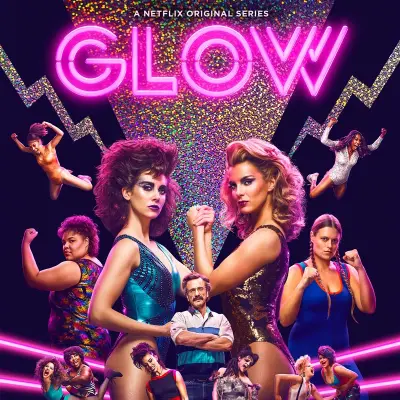GLOW Season 3 is what happens when a show goes "post-plot"
-

In Season 3, the Netflix female wrestling drama seems to be experimenting with a model of TV writing in which the plot is sidelined, says Sophie Gilbert. "It’s never felt more obvious that GLOW’s creators, Liz Flahive and Carly Mensch, are feeling constrained by the wrestling-league format," says Gilbert. "For one thing, there’s very little wrestling at all until the fifth episode, when the performers decide (without consulting their befuddled producer, Bash—played by Chris Lowell) to switch roles at the last minute to liven things up. Rather, Season 3 offers the chance to see what happens when a TV show goes post-plot, taking all the codes and mores that govern dramatic writing and cutting them loose. When it works, it’s because the characters still have a chemistry that overrides their directionless narrative, and because the writing on GLOW is still consistently funny, even as the series heads into darker territory. (In addition to the spiraling AIDS crisis, the new season weaves in mentions of the Holocaust and the Cambodian genocide.) At other times, it feels like GLOW is building itself around themes rather than stories: moms who work, workplace racism, homophobia, ambition."
ALSO:
- GLOW's third season dials down its tone a couple notches and turns its focus inward: The result is "a terrific season that highlights the forces that can fray a career, even a career in professional performative wrestling," says Jen Chaney. "Don’t get me wrong: There are still some broad comedy moments, some deliberately silly matches — there’s a wedding-themed one, and a surprisingly moving Christmas-themed one — and some very big hair. (I am convinced that a person could comfortably fit a bed, nightstand, and dresser inside Betty Gilpin’s teased-up blond ’do and live happily underneath its Aquanet roof.) But GLOW is less interested in spectacle and more interested in the mental states of its characters."
- GLOW avoids falling into a rut by leaning heavily into that rut: "The effect is that wrestling is a looming, even oppressive presence in the show, and it works," says Vivian Kane. "Going into a third season of a show with such tight parameters to its concept, there’s always the fear that things will get stale. So how does GLOW avoid falling into a rut? By leaning heavily into that rut. The characters, who are now living and working at a Las Vegas hotel off the strip, doing the exact same show every night, are stir-crazy. They’re bored and they’re restless and the stability of G.L.O.W. is now their prison, physically but even more so creatively."
- Las Vegas provides GLOW's writers ample creative opportunity to play with the show's core elements
- The new, introspective focus brings out some truly great performances from all involved
- GLOW is as funny and relevant as ever in Season 3
- GLOW continues to struggle to get a handle on their sprawling ensemble, but it remains one of the best shows about show business
- Co-creator Liz Flahive compares Season 3 to summer stock: "You do a play out of town and it’s not the same sh*t you’re dealing with in L.A.”
- GLOW's Season 3 production design aimed to make Vegas a "claustrophobic place" with living where they work and eat
- GLOW's Fan-Tan Hotel is not a real place in Las Vegas — but it is based on one
- How GLOW helped Betty Gilpin embrace her inner weirdo
- Geena Davis was thrilled to play a character who took on ageism: "I was certainly a big fan of GLOW," she tells EW. "I watched it and loved it. But they actually reached out to me with this idea. I thought it sounded really cool and immediately signed on. The thing that hooked me the most is that they said she was a former showgirl, and in some other dimension I’m a former showgirl! (Laughs) Ever since I was a little kid, I just loved something about those big headdresses and the way they walk and stuff like that. That really enticed me. They described the character as someone who had really changed her life and managed to stay in the same industry but moved things around to become someone in charge, because they figured a lot of showgirls, after you’re done, what are you going to do? She was able to land a high-powered position, which showed her mettle."
TOPICS: GLOW, Netflix, Alison Brie, Carly Mensch, Geena Davis, Liz Flahive, Production Design
More GLOW on Primetimer:
